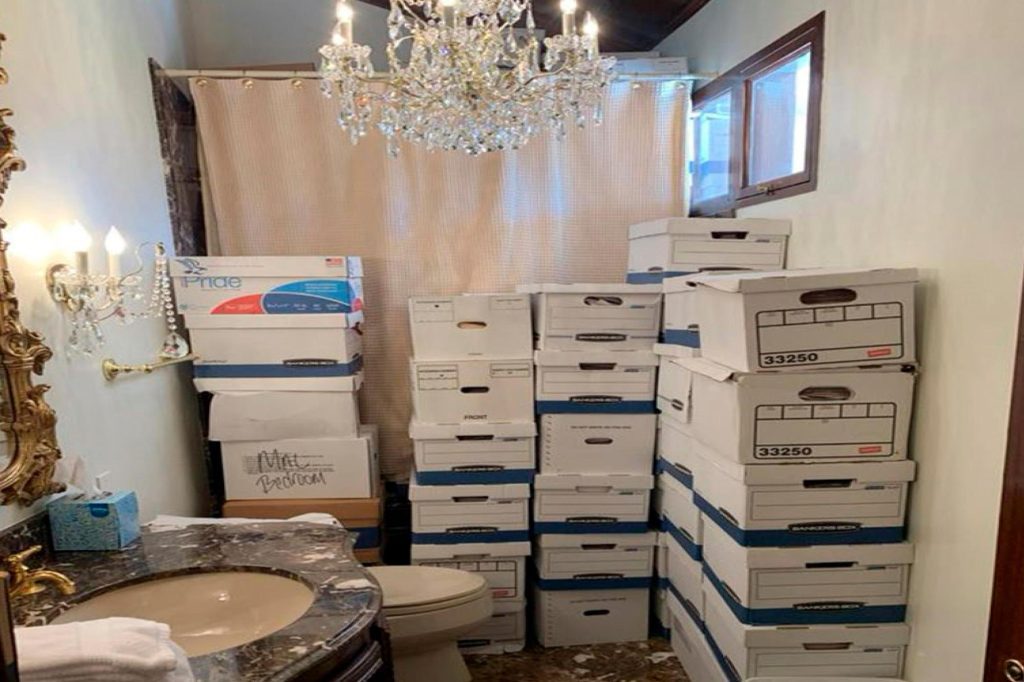By ERIC TUCKER, ALANNA DURKIN RICHER and TERRY SPENCER (Associated Press)
FORT PIERCE, Fla. (AP) — On Thursday, Donald Trump went to a federal courthouse in Florida where a judge will consider arguments about whether to dismiss the criminal case against the former president. He is accused of keeping classified documents at his Mar-a-Lago estate after leaving the White House.
The motorcade carrying the 2024 Republican presumptive presidential nominee arrived shortly before the hearing was set to begin before U.S. District Judge Aileen Cannon, who was nominated to the bench by Trump.
The disagreement is about how the Trump team understands the Presidential Records Act. They believe it gave him the power to label the documents as personal and keep them after his presidency.
On the other hand, Special counsel Jack Smith’s team says the files Trump is charged with possessing are presidential records, not personal ones. They argue that the statute does not apply to classified and top-secret documents like those kept at his Mar-a-Lago estate in Florida.
According to prosecutors, the Presidential Records Act does not allow Trump to unilaterally declare highly classified presidential records to be personal records, or prevent him from criminal investigations. They said this in a court filing last week.
It is not known when Cannon might make a decision, but the result will determine whether the case goes forward or, as Trump’s lawyers hope, it is thrown out before reaching a jury, which is unusual for a judge to do.
Cannon is also expected to hear arguments Thursday on a separate but related Trump team motion that claims the statute forming the majority of the criminal charges is unconstitutionally vague for a former president.
Given that the legal team has frequently referenced the Presidential Records Act since the FBI’s August 2022 search of Mar-a-Lago, it is not surprising that defense lawyers are seeking dismissal based on this law.
The 1978 law requires presidents leaving office to transfer their presidential records to the U.S. government for management. They are allowed to keep personal records, including private diaries and notes not prepared for government business.
Trump’s lawyers say he designated the records taken to Mar-a-Lago as personal property, which prosecutors claim included top-secret information and documents related to nuclear programs and the military capabilities of the U.S. and foreign adversaries.
Cannon has indicated before that she sees Trump’s status as a former president as setting him apart from others who have kept classified records.
After Trump's team sued the Justice Department in 2022 to retrieve his records, Cannon appointed a special master to independently review the documents taken during the FBI’s Mar-a-Lago search. However, a federal appeals court later overturned this appointment.
Recently, even when ruling in support of Smith's team on a procedural matter, Cannon specifically described the case as the "first-ever criminal prosecution of a former United States President." The president was the top classification authority over many documents the Special Counsel now wants to keep from him (and his cleared counsel) in a case without charges of transmission or delivery of national defense information.
Trump is accused of facing 40 felony charges in Florida, alleging that he deliberately kept numerous classified documents and refused to return them after leaving the White House. Prosecutors have emphasized the extent of the criminal behavior they expect to prove at trial, stating that "there has never been a case in American history in which a former official has engaged in conduct remotely similar to Trump's.
For example, they claim that Trump intentionally kept some of the nation's most sensitive documents, only returning a portion of them when asked by the National Archives. He then allegedly instructed his lawyer to hide records and lie to the FBI about no longer having them. He is also charged with getting staff to delete surveillance footage showing boxes of documents being moved around the property.
This is the second hearing this month in the Florida case, one of four prosecutions Trump is facing as he runs for the White House this year. Cannon heard arguments on March 1 about when to schedule a trial date but has not made an immediate decision. Both sides have suggested starting the trial in the summer.









